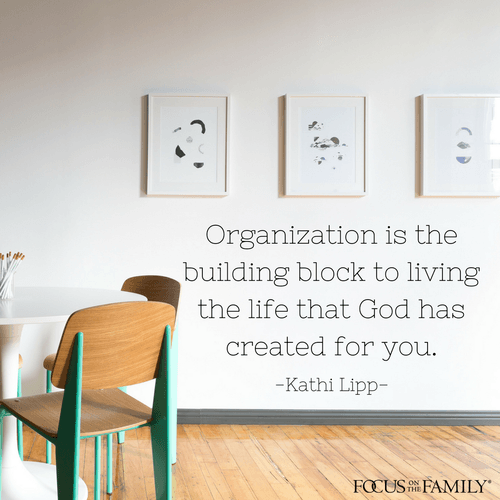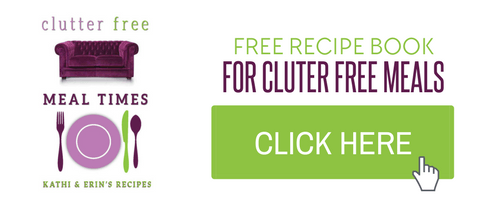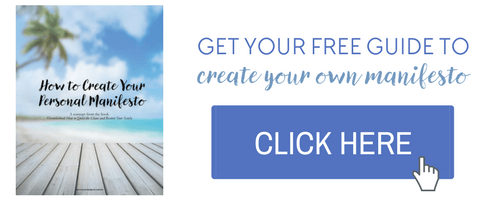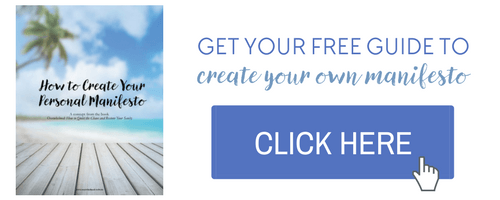Kathi Lipp's Blog, page 60
July 24, 2017
Practical Tips for Getting Organized Part 1
I am thrilled to be on Focus on the Family today and tomorrow discussing tips on getting organized. Back in 2013, Focus on the Family invited me out to speak about the principles in my book, The Get Yourself Organized Project. Jean Daly and I discuss why having an organized home is important as well as share several ways to tackle clutter.
At the original air date of this broadcast, Clutter Free wasn’t yet born which may seem interesting if you’ve ever asked me which of these two book should be read first. I always recommend reading Clutter Free first. Clutter Free helps you identify the reasons why the clutter exists in your life and how to tackle it. The Get Yourself Organized Project was written because I had tried all of the Martha Stewart type strategies and nothing had been effective in organizing my house. I discovered new, and most importantly, doable and easy steps in organizing my stuff and wanted to share it with all of my non-Martha types.
Listen in to Part 1 today to this fun and helpful broadcast that has stood the test of time. And check out The Get Yourself Organized Project if you are ready to organize all the important things in your life.
July 20, 2017
Surprising Clutter: You Will Never Guess What I Found Under My Couch
I started wading through the clutter in January. One week later I was disheartened. There was still a lot to do. I shared my dismay with my brave friend who had come over and worked alongside me for a bit, she said, “It will take a year.” She reminded me this was a process and that it would take more than a weekend to declutter. And here I am today, still working on organizing, decluttering, de-junking my house. I have made some progress and have discovered some surprising clutter.
The piles of toy parts, the box of notes from high school, and the bags of stained baby clothes, I expected. However, I was surprised to discover hidden pockets of clutter of a different variety. These were things I thought I would never misplace or lose track of. I unearthed encouraging words left unsaid, found compliments piled in the corners like stacks of magazines, and discovered a hoard of fun under the couch.
Surprising clutter
I found a box full of family time that still had the packing tape on it from our last move. Nothing really prepared me for the waves of regret that quickly eroded my pride in the progress I had made. The cost of clutter had not really hit me until that moment; clutter steals and hoards what we are capable of giving to others.
I had not realized that my disheveled closet was hoarding confidence or that the chaotic art room had my children’s creative tendencies squirreled away in half empty crayon boxes and dried up paint bottles. I started to think that maybe we just weren’t as creative, fun or as kind as we used to be, but it was just that the clutter had taken over and obscured these attributes from our hearts and minds. My creative, kind and fun-loving family was there all along.
It was just that we could only see the mess.
It didn’t take me long to realize I could not hold on to the the regret that came along with this discovery. I certainly could not afford to stockpile regret, so out it went and in came a new way of living and loving.
How to clear out the surprising clutter
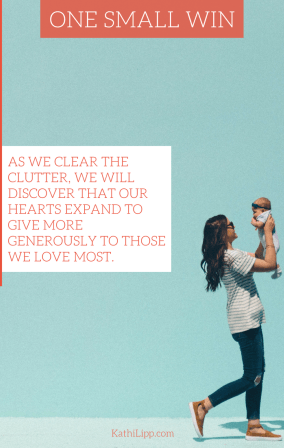 As we clear the clutter, we discover that our hearts expand to give more generously to those we love most, and isn’t that what we all want? I don’t need the old train table the kids played with years ago or the 20 reusable grocery bags that have taken over my side entryway, I do need every bit of my capacity to encourage my children and to love my husband well.
As we clear the clutter, we discover that our hearts expand to give more generously to those we love most, and isn’t that what we all want? I don’t need the old train table the kids played with years ago or the 20 reusable grocery bags that have taken over my side entryway, I do need every bit of my capacity to encourage my children and to love my husband well.
My words of affirmation and kindness must be said, otherwise they are just as useless as the boxes of VHS tapes in the basement. The fun hoard, along with the dust bunnies and dog toys, needs to come out from under the couch, so that our home can be a place of joy.
Clearing the clutter allows our hearts to be tuned into what is most important — the people we do life with. As I continue to declutter my home I am now more excited about what I will gain. An expanded heart ready to jump into joy, fun and love versus what I will lose.
 You can read more from Bethany Howard at bethanyhoward.com. She writes about finding fuel for joy and growth in the details of the daily. Her greatest leadership exercise has been her roles as wife and mom to three. She is a graduate of Leverage: The Speaker Conference.
You can read more from Bethany Howard at bethanyhoward.com. She writes about finding fuel for joy and growth in the details of the daily. Her greatest leadership exercise has been her roles as wife and mom to three. She is a graduate of Leverage: The Speaker Conference.
Surprising Clutter: You Will Never Guess What I Found Under My Couch
July 18, 2017
Episode #261: Making Love Last: Divorce-Proofing Your Young Marriage with Laura Taggart
Marriage is such hard work. We all would like an easy way to divorce-proof our relationship. None of us go into marriage thinking it won’t last but most of us also have no idea what it takes to keep the marriage from failing. Guest, Laura Taggart, author of the new book Making Love Last: Divorce-Proofing Your Young Marriage, answers Kathi’s hard questions about how we handle conflict, why marriage is difficult, and what we can do about it from the very beginning.
Early on in our marriages, differences can be scary and cause a lot of tension. Laura addresses the ebbs and flows of different stages of our marriage, how we can pursue happiness together, learning how to get through difficulties gracefully and how to deal with our own feelings.
If you are married, have a friend whose marriage is in a tough spot, listen in for some new insight in keeping marriages strong.
Giveaway!
We are giving away a copy of Laura’s new book! Comment below and tell us what is one thing about marriage that surprised you. One winner will be chosen. Open to US residents only.
Episode #261: Making Love Last: Divorce-Proofing Your Young Marriage with Laura Taggart
July 17, 2017
Creating a Project Management Notebook: The Right To-Do List
For years I tried to manage all I had to do on one to-do list. I tried prioritizing that list using various methods, all without success.
The problem with having one list is it’s like trying to force a semi-truck to drive down a country lane next to a bicycle. Or force my size 9 feet into dainty size 6 shoes. Some things just don’t fit. Here’s an example of what my list used to look like:
1. Make orthodontist appointment for Robbie
2. Plan Dylan’s birthday party
3. Deposit check
4. Redesign blog
5. Buy dog food
6. Clean the house
These are all normal things a woman might do. So, what was the problem?
The problem is three of those items aren’t simple tasks. Calling the orthodontist’s office takes one step, and it’s done. Boom. Check that baby off the list! But planning a party, redesigning a blog, and clean the house are made up of multiple tasks. To put them on a to-do list is just asking for failure.
Here’s what I’ve learned: cleaning the house isn’t a task. It’s a project. Projects don’t belong on a to-do list. Only single-step tasks belong there.
Once I realized the mistake I’d been making for years, I tossed my to-do list and started fresh.
Then I did something brave. I did a complete inventory of everything I needed to do. It took days to complete. I decided to include immediate needs and everything I’d been putting off. The small and the big all got listed.
Once I was sure I’d captured everything, I sat down and had a good cry. My life was seriously out of control.
Drying my tears, I reviewed the monstrous list and divided it into two categories: one-step tasks and multi-step projects. That was better. But I wasn’t done yet. I looked at all the projects, and realized some of them were urgent and others weren’t. Then I divided that list into current and future projects.
There was one more step. Since every big project is completed one step at a time, I realized I needed to add tasks to each of my projects. So I got some more paper and started to list all the tasks I could think of for each project.
These lists became the foundation of my project management notebook. And yes, I did put it in a three-ring binder. I know I could have created a digital notebook, but there was something about putting it on paper that made it real for me. Although I still had a lot to do, having it all in one place brought relief.
Now, writing my to-do list for the day is like going to a buffet and picking a piece of chicken here and a scoop of mac and cheese there. I look over my master lists and only put on my to-do list the tasks I can realistically accomplish that day. I might pick a simple task, like make an appointment, then pull another task from a project list.
This system revolutionized my approach to getting work done. It also eliminated a few of my reasons for procrastination, which included forgetting things (now they were in my safe place) and feeling overwhelmed when I looked at a big project on my to-do list.
Now my to-do list might have five items on it, rather than 25. Five is much more manageable. And when I finish those five, I can go back for more from my project management list.
Over the years, this system has actually helped me manage my workload so well that I don’t have to create massive master lists anymore. The process helped me realize I’d taken on too much, and I did some serious editing. But when I get overloaded—and it still does happen—I know to go back and create that master list again.
Heavenly Father, thank You for creating order. Help me bring order to my to-do list and manage my workload more efficiently. I want to bring glory to you in every area of my life. In Jesus name, Amen.
Related Resources:
If you need more margin in your life, you might appreciate this recent post on Glynnis’ blog.
Create a master list of everything you need to do – now and in the future. Put it all in one place and then divide it into tasks and projects.
Creating a Project Management Notebook: The Right To-Do List
July 13, 2017
Finding Rest in Summer When You Feel It isn’t an Option

Finding rest in summer
Summer’s here! Time for fun, right? Well … maybe, but work keeps right on going. Kids are home, laundry’s piling up, and that car doesn’t pack itself for vacation. Finding rest in summer might seem out of reach.
It’s hard to carve out time for rest, even in the summer, but God gives us some rich encouragement in His Word. Amy shares a scripture that will feed your soul and an action step that will help create your best, most restful summer yet.
July 11, 2017
Episode #260: Doing Busy Better – Part 2 with Glynnis Whitwer
Kathi and Glynnis pick up the conversation from where they left off last week discussing Doing Busy Better: Enjoying God’s Gifts of Work and Rest. They wrap the discussion on “bad busy” and pick up the conversation with what “good busy” looks and feels like in our lives. From her own experience, Glynnis realized she is always going to be busy. It’s her personality. She is her best with a lot going on. She was able to stand back and realize what kinds of busy fostered good or bad in her life.
Find out what the “good busy” is in your life and how to identify if you’ve crossed over into bad busy.
Book Giveaway
Leave a comment on this podcast within 7 days telling us “What part of busy is God nudging you to give away?” A winner will be selected randomly from the comments to receive a copy of Doing Busy Better: Enjoying God’s Gifts of Work and Rest.
*Book Giveaway only available to US participants.
Episode #260: Doing Busy Better – Part 2 with Glynnis Whitwer
July 6, 2017
Sleep Like a Baby: How to Have a Clutter-Free Mind
Have you ever had a time when you secretly crowned yourself the Clutter-Free Queen of your house, and then you remembered the storage space under your basement stairs? You know, the storage space that was supposed to be only for Christmas decorations, but now houses every holiday decoration your child ever made from preschool through high school?
I, too, had one of those moments when I recently discovered a forgotten storage space in my life where I kept outdated and unwanted items. My storage space is smaller than the closet under the stairs, but it has enormous storage capacity. You guessed right, it’s in my mind!
Don’t Panic!
If you haven’t de-cluttered your brain yet, you don’t need to throw away your prized tiara. The mind can be conquered just like every other closet and drawer we face. When we successfully delete all the unnecessary information in our minds, we create room for new and peaceful thoughts during the day, and for restful sleep at night.
When we are at rest, particularly at night, our entire being, the mind, body, soul and spirit reaps the benefits. As I discovered while researching my book, Winning the Battle for the Mind, unresolved issues in our mind often disturb our sleep at night.
As a Christian, I know from scripture that God gives us sleep. And the night should be a time for rejuvenation, rest and even revelation from God. Our Father did not intend for human beings to lie awake, tossing and turning on their beds all night.
Is a clutter-free mind possible?
Actually, have you ever heard the phrase, “I slept like a baby”? Well, God’s intention for us is to sleep like a healthy baby, in perfect peace. I believe this is the picture God had in mind when He designed our body for sleep. And yet, our mind robs us of the rest we were designed to receive at night.
The astonishing fact is that this small area of our body, weighing just three pounds, holds more than all our books, files, pictures and memorabilia combined. You may have a garage full of filing cabinets you purged. Maybe thousands of files shredded, but the brain can hold so much more information than anything you’ve ever shredded, trashed, or given over for consignment.
The brain holds about 25 million books worth of information. In computer storage terms that would be as much as 1000 terabytes of information. In comparison, the National Archives of Britain holds 900 years of history, which are contained in 70 terabytes.
Don’t worry!
Not everything in our brain has to be deleted before you can have a restful night of sleep. Deleting unnecessary files in your mind is not like the reformatting process for a computer in which all the files are deleted. A lobotomy isn’t necessary. We do have valuable information stored in our mind. Just as on a computer hard drive, there are many good files.
However, as I began an inventory in the filing cabinets stored in my brain, I was both shocked and embarrassed by what I found. I kind of felt the same way when I opened my closet in front of my neighbor and my belongings started tumbling out the door.
With the desire to sleep like a baby as my motivator, I decided it was time to look at my inventory and de-clutter my brain. Some of the contents of my filing cabinets were files that were decades old. I hadn’t looked at them for years, but they were still there, taking up space. Talk about cobwebs!
So here’s my list of seven storage cabinets that I’ve readied for removal.
1. Failures
2. Betrayals
3. Regrets
4. Disappointments
5. Conflicts
6. Accusations
7. Shame
Now What?
This storage space is not as easy to deal with as the closet under the stairs. I can’t put the contents in the dumpster or take them to Goodwill. So I devised a two-step method. It is called Give and Receive. Here’s how it works:
GIVE: Rather than calling a shredding service to shred all the files out of my seven cabinets, I took each file and gave it to God. Some files were harder to part with than others, but my desire for better sleep provided the power to pry the file loose from my grip. The surprising thing about giving the filing cabinets to Him was that He gave me something good to replace each file I gave Him. The shredding company never gave me anything for my files except a bill!
In order to benefit from God’s generosity, I need to anticipate and be willing to participate in an exchange with Him. This is the second step—receive.
RECEIVE: God is the ultimate Giver. He is resourceful, imaginative, and knows exactly what I need to receive. Here is a list of the seven exchanges I received from Him.
1. Courage to try again in place of failures.
2. Comfort for the pain of betrayals.
3. Hope for the future in place of regrets.
4. Joy in the place of disappointments.
5. Love to cover the conflicts.
6. Blessing to replace the accusations.
7. Forgiveness for all my shame.
Your brain may not have as many cabinets tucked as mine did. Regardless of how many you have, think about focusing on one cabinet a week. Give God the contents of your cabinets. Once you’ve taken this first step, the next step is easy, just receive what God gives you in exchange for what you released to Him.
You will be amazed at what He has already planned to give you! He has been waiting for this opportunity to fill your mind with good things. As you enjoy the fruit of your hard work—a clutter free mind, you’ll find sleeping like a baby comes more easily.
 Faith Blatchford, Author of Winning the Battle For the Night: God’s Plan for Sleep, Dreams and Revelation is also a conference speaker and composer. She has a B.A. in Religion from Vassar College. She is a pastoral counselor, as well as a creativity coach and sleep/dream consultant. Her goal whether in writing, speaking or personal ministry is to help people experience freedom in every area of life through deep connection with God, the giver of hope.
Faith Blatchford, Author of Winning the Battle For the Night: God’s Plan for Sleep, Dreams and Revelation is also a conference speaker and composer. She has a B.A. in Religion from Vassar College. She is a pastoral counselor, as well as a creativity coach and sleep/dream consultant. Her goal whether in writing, speaking or personal ministry is to help people experience freedom in every area of life through deep connection with God, the giver of hope.
July 4, 2017
Episode #259: Doing Busy Better with Glynnis Whitwer
Kathi talks with her guest, Glynnis Whitwer, author of Doing Busy Better: Enjoying God’s Gifts of Work and Rest. They discuss how being busy is not wrong, but there are ways to do it better where a sustainable balance exists between work and rest. And don’t we all need to find that balance?! And better yet, can’t we do it without all the guilt?! (AMEN!) We can do busy better.
Glynnis points out, “This is for the woman who works too much! The woman who feels guilty when working and guilty when they rest.” Can you relate? Glynnis explains four kinds of “bad” busy:
Busy without boundaries
Busy Buddy
I’m not called to do what I am doing.
Busywork
But be encouraged, not all busy is BAD. Listen in to learn more and start doing busy better!
June 28, 2017
Are You Always in a Hurry? Count the Cost of Yes
“I’m overwhelmed. I just need a break!” I said to my counselor. Minutes later, I left her second story office and hurried the length of the deserted hallway. I glanced at my phone while descending the stairs. My phone was dead, but I knew it was close to 4:00. I had just enough time to get to school and pick up my kids before their practices ended at 4:30. As I took the next step, I missed the stair and tumbled forward. When I came to a stop, I heard a loud “pop.” The pain was unbearable.
Tears came fast and furious and I cried out for help.
No one heard me.
I tried to push myself up to stand, but my left foot refused to bear any weight.
I cried for help again, thinking there must be someone nearby.
Again, no one heard me.
I tried my phone a second time in vain. My husband was in New York on business. Picking up the kids wouldn’t wait. I gritted my teeth and pushed myself up from the base of the stairs. I could stand on my right foot, but my left was completely useless. With great pain, I hopped to the car, frequently banging my left foot against the pavement. I managed to get myself into the car and drive across town to the school, sobbing the entire way.
The “break” I needed
I’d love to tell you my injuries were minimal and I healed quickly, but that’s not what happened. Instead, I got the “break” I needed in the form of broken bones and multiple sprains in my foot and ankle, six months of pain, restrictions, physical therapy, and a complete overhaul of my demanding pace of life.
Before my fall, I was at a breaking-point. Maybe you’ve been there too.
I had taken on too many responsibilities – running a nonprofit, serving as team mom, leading a Bible study, making play costumes, and so much more. I spent the previous year moving at record speed. I like to keep busy, but I was over-committed, under-rested, and probably not the most pleasant person to be around.
We don’t have to live that way.
Count the cost of yes
What I learned through my ordeal was that I’m capable of only so much. I’m learning to live within my limits. That means I only commit to a certain number of activities, projects and responsibilities. When my plate is full, I must eliminate an item before adding another. I guard my time and energy or they’ll be swallowed up by my desire to say “yes” to more than I can sanely accomplish.
If I hadn’t been rushed and feeling overwhelmed, I’m sure I wouldn’t have missed that step. I likely wouldn’t have even been in counselor’s office that day. The cost of over-commitment was high.
One of the things I contemplated during my recovery was that Jesus never rushed. He moved at an intentional pace. His time of ministry on earth was very brief, only three years. If anyone had a reason to pick his pace and do more than humanly possible, it was Jesus. But, he didn’t.
I’m learning to follow his example.
Luke 14:28 reminds us to count the cost, “For which of you, desiring to build a tower, does not first sit down and count the cost, whether he has enough to complete it?”
When we’re tempted to say “yes” and add one more thing to our busy schedules, pause and acknowledge that “yes” will cost us something. At the very least, it means we have to say “no” to other opportunities.
What will saying “yes” cost you? Will it cost your peace? Dilute your focus?
When we commit to pause and count the cost before taking on another thing, we are empowered to manage the opportunities that come our way. We focus on what we’re meant to do, the things most important to us. We walk in freedom, unhurried and confident.
What are you doing to follow Jesus’ example of walking out your life intentionally and unhurried? How have you learned to live within the limits of your time and energy?
 Elizabeth M. Thompson is a writer and speaker. Prayer is her super-power and she loves helping women develop meaningful prayer lives. She and her husband have three children. They live, bike, kayak, and hike along the American River near Sacramento, CA. Stop by her website for a free download of “Jumpstart Your Stalled Prayer Life.”
Elizabeth M. Thompson is a writer and speaker. Prayer is her super-power and she loves helping women develop meaningful prayer lives. She and her husband have three children. They live, bike, kayak, and hike along the American River near Sacramento, CA. Stop by her website for a free download of “Jumpstart Your Stalled Prayer Life.”
June 27, 2017
Episode #258: Whispers of Rest
Life is noisy. What would happen if every day – for the next 40 days – you soaked in God’s love as He intimately whispered words of rest just for you?
Kathi talks with Bonnie Gray, author of Whispers of Rest: 40 Days of God’s Love to Revitalize Your Soul . Kathi and Bonnie discuss why it’s difficult for women to carve out time to take care of themselves. From our deep rooted need to take care of everyone else first. Even after everyone else is cared for we resist and hold back from caring for ourselves. We have a sense of guilt about taking care of our own needs.
Bonnie gives us some great suggestions on how to inject pockets time into your life to spend with God and beautiful things in your life.
Book Giveaway
Bonnie is giving away two books to our listeners. Just leave a comment within the next 7 days and tell us how you are going to inject a pocket of rest into your day.
Two listeners will be selected at random to receive a copy of Whispers of Rest.
Book Giveaway only available for our US listeners.


